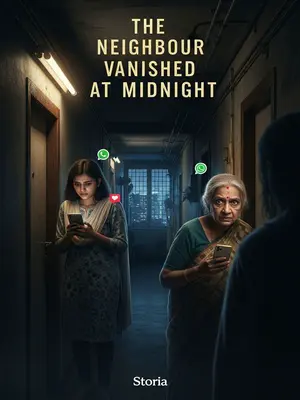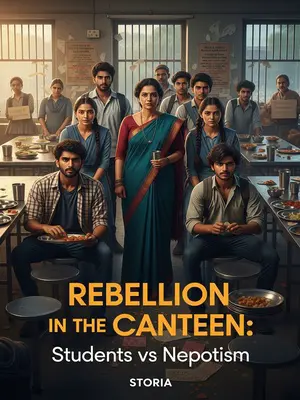Chapter 3: The Pickled Mango Offensive
The next day, I went out drinking with my buddies. When I got home and stepped out of the lift, I found a giant jar of pickled mango right outside my door.
The society corridors were already stifling from the Mumbai humidity. The jar sweated in the humidity, oozing sticky brine onto the floor tiles. The moment I stepped into my landing, the air felt heavier, and then the smell hit me full-force.
It was the hottest part of August and September—humid, muggy, and the sour stench was indescribable. It smelled like a pile of rotting fish and prawns, or maybe more like festering nala water.
Even my old sneakers, after Holi, hadn’t smelt this bad. For a second, I wondered if the smell would haunt my dreams, like the ghost stories Amma used to tell.
It was so damn foul it could make a person gag.
No need to guess—it was definitely the handiwork of the guy across the landing.
I marched over and knocked on his door.
I banged on the door, not too hard, but just enough to let him know I meant business. The dull thuds echoed through the corridor, mixing with the distant ring of a pressure cooker whistle from below.
A burly bald man with a fleshy face answered, looking irritated.
He was the type of man who wore a banyan even under a collared shirt, and his eyebrows met in a permanent scowl. He looked me up and down, as if expecting me to beg for a cup of sugar.
"Who are you? What do you want?"
I pointed at the jar of pickled mango:
"This is yours, right? It’s not okay to leave it out here."
He looked me up and down, then stuck his chin out:
"What’s wrong with it?"
"The smell is unbearable. Who could stand it?"
"If you can’t stand it, tough luck. My wife’s pregnant and craves sour food. I can’t keep it inside and stink her out, can I?"
So he does know it reeks.
He said it like it was the most logical thing in the world, as if the smell was a blessing for the entire floor.
"If you have to store it, put it by your own door. You put it here, and I can barely open mine."
"Are you blind? My side’s already full. Yours is empty anyway. And this is a common hallway—first come, first served. If you want to blame someone, blame yourself for not claiming the spot first."
He was so shameless and self-righteous that most people would have a heart attack dealing with him.
Any normal person would have just shaken their head and walked away, muttering under their breath. But me? I stood my ground, arms crossed, refusing to be bullied.
I hadn’t said anything else, but the bald man started shifting blame:
"And you—how dare you come to me? It’s already ten o’clock. Didn’t I say yesterday, no using the lift after nine? You’re disturbing my wife’s rest. Can’t remember? Want me to print those rules out and stick them on your door?"
Arrey, this is just like my old school principal scolding students.
The only thing missing was the threat of a phone call to my parents. Suddenly, I was ten years old again, standing outside the principal’s office.
People like this are impossible to reason with.
I didn’t bother wasting my breath and turned to go home.
But when I reached the jar of pickled mango, I staggered, dry-heaved a few times, then—"bleeaugh"—vomited right into that stinking jar.
Luckily, neither the floor nor my clothes got dirty.
All those years of eating roadside pani puri had trained my stomach well. I wiped my mouth, shook my head, and pressed the doorbell with the dignity of a man who’d just done his civic duty.
The bald man, who was about to close his door, froze. His eyes almost popped out of his head:
"Arrey Ram! Are you sick or what?"













